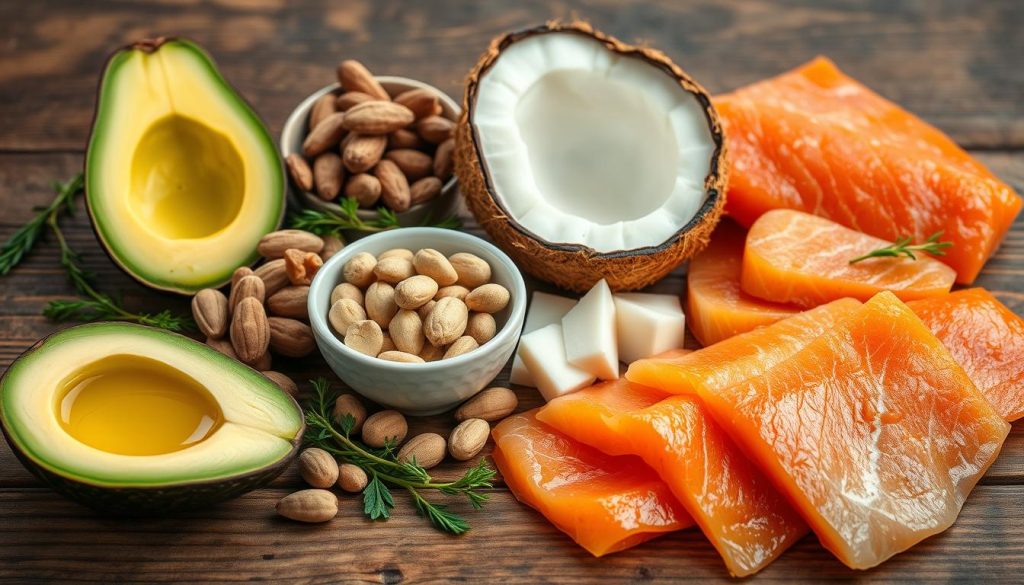Can this low-carb lifestyle really be the key to effortless weight loss?
The ketogenic diet has become very popular. But what’s the science behind its fat-burning state? This section will introduce you to the basics of the keto diet. It explains the changes your body goes through.
We’ll explore how ketosis helps you lose weight by burning fat instead of carbs. You’ll learn from the Journal of Nutrition and Metabolism, registered dietitian Lisa Young, and the Centers for Disease Control and Prevention (CDC). This will give you a full picture of why the keto diet is a favorite for many looking to lose weight.
Quick Recommendation: Our blog covers the science behind keto and how it aids weight loss. If you want to dive deeper into the ketogenic diet, we recommend The Ultimate Keto Meal Plan.
Understanding the Ketogenic Diet
The ketogenic diet is based on keto diet principles that change how we lose weight and stay healthy. It focuses on eating more fats and fewer carbs, keeping protein levels moderate. This balance helps your body enter a state of nutritional ketosis.
In this state, your body uses fat for energy instead of carbs. You need to eat mostly fats (70-75% of calories), some protein (20-25%), and very few carbs (5-10%). This mix is key to burning fat as your main fuel.
Starting a ketogenic diet means knowing what foods to eat and avoid. You should eat healthy fats like avocados, nuts, and oils. Also, include meats, fish, and low-carb veggies. But cut down on carbs in foods like bread, pasta, and sweets.
Experts say following these keto diet rules can lead to weight loss, more energy, and clearer thinking. The American Nutrition Association backs these benefits.
Using the right mix of keto macronutrients keeps your energy steady. A study showed that a high-fat diet helps keep energy levels up and aids in fat loss.

Now you know the basics, you can start your keto journey. It’s not just a diet; it’s a lifestyle change for better health.
How Ketosis Works
Ketosis is a cool process where your body starts using ketone bodies for energy when it doesn’t have enough glucose. This happens when you eat very few carbs. Your liver then turns your fat into ketones.

Ketosis helps you burn fat more efficiently. Your body gets better at using fat for energy, which can lead to weight loss. Studies show that ketosis is good for managing weight and keeping blood sugar stable.
It’s important to know the difference between ketosis and ketoacidosis. Ketosis from a ketogenic diet is safe, but ketoacidosis is dangerous and needs medical help right away.
An endocrinologist says a well-balanced ketogenic diet is safe. They also point out the long-term benefits of staying in a fat-adapted state. This improves how your body handles glucose.
The Role of Carbohydrates
It’s important to know how carbs work in your body, especially on diets like keto. Carbs in a keto diet help limit your intake. This reduces glycogen stores, which are your body’s quick energy source.
By cutting down on carbs, your glycogen stores get used up. Your body then turns to fats for energy. This is why many people lose weight and feel more energetic on keto.
Sugar’s effect on ketosis is huge. Refined sugars and carbs can raise your blood sugar. This can mess up your metabolism. Staying away from these sugars helps your body stay in ketosis, burning fats for energy.

A study on metabolic health shows that fewer carbs lower insulin levels. This helps manage blood sugar better. Nutrition experts say controlling carb intake is key to staying in ketosis.
Infographics from dietary groups show how carbs in keto diets change your energy source. They help your body use fats instead of glycogen. This shift is crucial for the benefits many see on the ketogenic diet.
The Role of Fats in Keto
In the ketogenic diet, fats are your main energy source. But not all fats are the same. It’s key to know the difference between saturated and unsaturated fats.
Saturated fats are solid at room temperature and found in animal products like butter and cheese. Unsaturated fats, which include monounsaturated and polyunsaturated fats, are liquid. They come from plants and fish.
Healthy fats are vital for your well-being. Monounsaturated fats, found in avocados and olive oil, are good for your heart. Polyunsaturated fats, like omega-3 fatty acids from fish, help your brain function. A balance between these fats can make your keto diet better.
MCT oil is a great addition to your keto diet. Short for medium-chain triglycerides, it turns into ketones quickly. This fuels your brain and body more efficiently than other fats.
A study by the American Journal of Clinical Nutrition found MCT oil boosts ketosis. This leads to faster fat loss and more energy.

It’s crucial to limit saturated fats and focus on healthy fats. For example, use MCT oil or extra virgin olive oil for cooking. This way, you get good fats without too much of the bad, processed ones.
Keto users share their success stories. They say choosing the right fats and avoiding processed foods helps them stick to the diet. Quality is key for a successful keto journey.
Impact of Keto on Hunger Hormones
Starting a ketogenic diet can change how you feel hunger and fullness. This change is because of how it affects hunger hormones like ghrelin and leptin. These hormones are key in controlling how hungry or full you feel.
Ghrelin is called the “hunger hormone” because it makes you feel hungry. On a keto diet, ghrelin levels often go down. This can help cut down on cravings.
Leptin, or the “satiety hormone,” tells your brain you’re full. Keeping ghrelin and leptin in balance helps you feel full longer. This helps with weight loss by controlling hunger.
Studies in nutritional endocrinology show that balancing ghrelin and leptin is vital for feeling full. Doctors who work on weight management say people on keto diets feel hunger and fullness better. Research also shows that keto diets improve ghrelin and leptin balance, making you feel fuller.
Metabolic Advantages of Keto
The ketogenic diet has many benefits for your metabolism. It helps your body manage blood sugar better. This is great for people with insulin resistance or type 2 diabetes.
It also makes your body more flexible. You can use carbs and fats for energy. This makes you feel more energetic all day.
The diet’s fat content boosts your metabolic rate. This means you burn more energy. Studies show it helps with weight control over time.
Experts like those from the Joslin Diabetes Center support keto’s benefits. The American Diabetes Association also notes its positive effects on insulin sensitivity. This makes keto a good choice for long-term health.
Starting a ketogenic lifestyle can improve your health. You’ll feel better and be healthier overall.
Quick Recommendation: Our blog covers the science behind keto and how it aids weight loss. If you want to dive deeper into the ketogenic diet, we recommend The Ultimate Keto Meal Plan.
Keto and Physical Performance
Many athletes have seen great benefits from endurance training on keto. The ketogenic diet uses fat as the main energy source. This helps athletes go longer without feeling tired, unlike when they eat carbs.
Research shows that athletes on keto use energy better. Fats give a steady energy flow, key for long races. Athletes on keto often stay strong longer and feel less tired.
But, there are some downsides. High-intensity sports might not do as well on keto. These sports need quick energy, which carbs provide better. Fitness trainers have mixed views, with some athletes doing great and others struggling.
Many athletes say keto has changed their game. They feel more energetic and recover faster. Their performance numbers often improve, with some hitting new personal records.
Keto Diet and Mental Clarity
Starting a ketogenic diet can bring many cognitive benefits. One key advantage is better mental clarity and focus. When your body goes into ketosis, it uses ketones for brain energy. These ketones help improve your brain functions.
Studies show that ketones are a great energy source for the brain. They provide steady fuel for sharp focus. They might also protect the brain over time.
Many people say they feel mentally clearer on a keto diet. Their stories add to our understanding of keto’s benefits. Doctors also see improved focus and mood in some patients.
Adding these benefits to your day can make your mind sharper. It also helps your overall brain health.
Potential Drawbacks of Keto
The ketogenic diet has many benefits, but it also has some downsides. One major issue is the “keto flu.” This includes symptoms like fatigue, headaches, and feeling irritable. These symptoms happen when you first start keto and are usually short-lived.
Drinking plenty of water and getting enough electrolytes can help ease these symptoms. This makes the transition smoother.
Another concern is the risk of not getting enough nutrients. Eating fewer carbs means you might miss out on vitamins and minerals. These are found in foods like fruits, veggies, and whole grains.
To avoid this, eat a variety of low-carb foods that are also nutrient-rich. You might also need to take supplements to get all the nutrients you need.
There’s also debate about the long-term health effects of keto. Some research points to possible problems like higher cholesterol or heart issues. It’s important to get regular check-ups and blood tests to watch for these risks.
By being aware of these potential issues and taking steps to manage them, you can enjoy the benefits of keto. Always talk to a doctor before starting any new diet. This ensures it’s right for you.
Personalizing Your Keto Experience
Everyone’s journey on the ketogenic diet is different. It’s important to make it fit your lifestyle and goals. Tailored keto plans can make your experience more enjoyable and lasting.
Knowing your personal macronutrient needs is crucial. The right mix of fats, proteins, and carbs varies from person to person. A keto dietitian can guide you in finding the perfect balance for your body.
It’s also key to think about your social and cultural eating habits. Adding these to your keto diet makes it more flexible and less restrictive. Many people have successfully integrated the diet into their lives, enjoying traditional meals in a keto-friendly way.
Adopting responsive dieting keeps your keto journey flexible and adaptable. By creating plans that fit your unique needs, you can confidently follow the ketogenic diet.
Common Misconceptions About Keto
Starting the keto journey often sparks skepticism because of myths. Let’s clear up common keto myths and understand this diet better. Many think the keto diet is all about eating lots of bacon and butter. But, it’s actually about eating a variety of healthy fats, proteins, and veggies.
Another myth is that ketosis is dangerous. But, ketosis is a natural metabolic state. Doctors, like those at the Mayo Clinic, say it’s safe for most people. They also say it can have many health benefits if done right.
Some think keto diets raise bad cholesterol levels. But, studies show that many people’s cholesterol levels actually get better on keto. Experts, like those from the American Heart Association, say it’s the quality of fats that matters, not just the amount.
Many think athletes can’t do well on a low-carb diet. But, many athletes have shown great performance on keto. They prove that the body can adapt to use energy differently.
Lastly, some believe the keto diet is too restrictive. But, there’s a wide range of foods to enjoy, from leafy greens to nuts and seeds. This makes the diet fun and doable for the long term.
Conclusion
Starting your keto diet journey is exciting. Remember, lasting weight loss comes from knowing the science behind it. This article has shown you how the ketogenic diet works. It helps you lose weight by using ketosis and controlling hunger hormones.
It’s also important to understand the role of carbs, fats, and the diet’s metabolic benefits. You’ve learned how to make the keto diet work for you. This means making it fit your health goals and lifestyle.
While there might be some downsides, you can avoid them with the right knowledge and help. The keto diet can boost your physical and mental health. It’s a complete way to improve your health.
Let the success stories and advice from experts inspire you. The ketogenic diet is a solid choice for your health goals. By making it your own, you’ll see lasting weight loss and better health.
Quick Recommendation: Our blog covers the science behind keto and how it aids weight loss. If you want to dive deeper into the ketogenic diet, we recommend The Ultimate Keto Meal Plan.


This blog post is packed with great content!
Your blog has been a constant source of support and encouragement for me I am grateful for your words of wisdom and positivity
I have been struggling with this issue for a while and your post has provided me with much-needed guidance and clarity Thank you so much
I don’t think the title of your article matches the content lol. Just kidding, mainly because I had some doubts after reading the article.
It’s clear that you are passionate about making a positive impact and your blog is a testament to that Thank you for all that you do
Your posts always speak to me on a personal level and I believe that is a testament to your authenticity and genuine nature